Russia-Ukraine war: List of key events, day 1,388
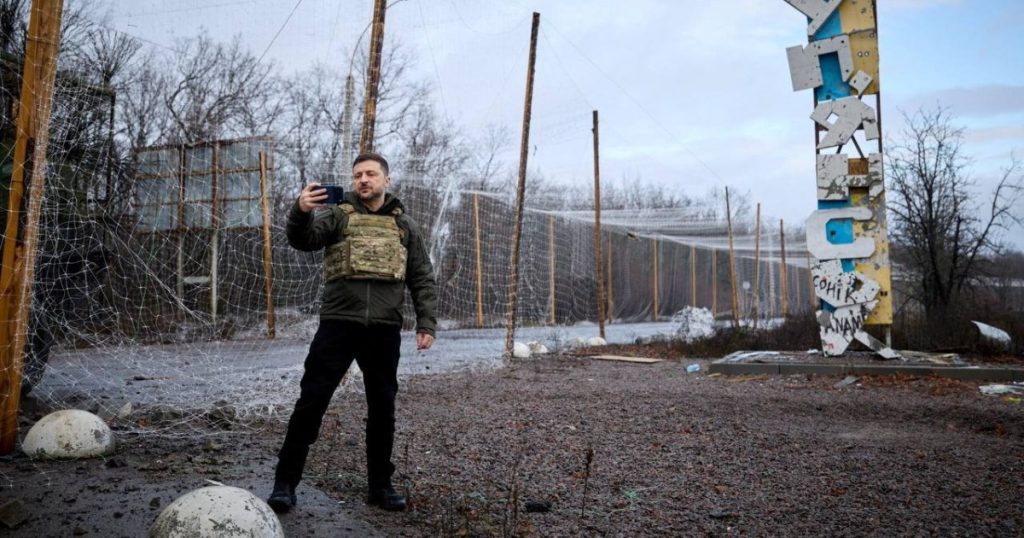
These are the key developments from day 1,388 of Russia’s war on Ukraine. By News Agencies Published On 13 Dec 202513 Dec 2025 Click here to share on social media share2 Share Here’s where things stand on Saturday, December 13: Fighting Ukrainian forces said they had retaken parts of the northeastern town of Kupiansk and encircled Russian troops there, as President Volodymyr Zelenskyy visited the area and praised the operation, saying it strengthened Ukraine diplomatically. In a video clip, President Zelenskyy, wearing a bulletproof vest, is seen standing in front of a sign bearing the town’s name at the entrance to Kupiansk. “Today it is extremely important to achieve results on the front lines so that Ukraine can achieve results in diplomacy,” he said. Ukrainian drones struck two Russian oil rigs in the Caspian Sea, an official in the Security Service of Ukraine (SBU) said. The SBU drones hit the Filanovsky and Korchagin oil rigs, which both belong to Russia’s Lukoil. The Filanovsky rig – part of Russia’s largest Caspian oilfield – came under attack earlier this week as Ukraine steps up its campaign to disrupt Russian oil and gas output. Ukraine said it conducted an operation alongside a local resistance movement to hit two Russian ships transporting weapons and military equipment in the Caspian Sea. They did not specify when the strike took place. Ukraine’s military also said it attacked a major Russian oil refinery in Yaroslavl, northeast of Moscow, and industry sources said the facility had suspended output. Russia attacked Ukraine’s Chornomorsk and Odesa ports, damaging three Turkish-owned vessels, including a civilian ship carrying food supplies, Ukrainian officials said. Moscow previously threatened to cut “Ukraine off from the sea” in retaliation for Kyiv’s maritime drone attacks on its “shadow fleet” tankers thought to be used to export oil. Russia also attacked energy facilities in the southern Ukrainian Odesa region overnight, causing fires and leaving several settlements in the region without electricity, the local governor and emergency service said. Russia’s Ministry of Defence said it had destroyed 90 Ukrainian drones over the country and the Black Sea overnight. Moscow’s Sheremetyevo airport said it suspended departures amid the overnight drone attacks, while in the city of Tver, 181km (112 miles) northwest of Moscow, authorities said seven people were injured. Peace deal Advertisement Turkiye has called for an urgent end to the war in Ukraine after Turkish-owned vessels were damaged in an attack on Ukraine’s Chornomorsk port by Russia, saying the incident underscored risks to Black Sea maritime security. Ankara called for an arrangement to suspend attacks targeting navigation safety, energy and port infrastructure “to prevent escalation”. Turkish President Recep Tayyip Erdogan also met with Russian President Vladimir Putin, telling him that a limited ceasefire around energy facilities and ports in particular could be beneficial. Ukrainian, European and United States national security advisers met and discussed coordination of their positions on proposals for a settlement to the conflict in Ukraine, the head of the Ukrainian negotiating team, Rustem Umerov, said. Ukraine’s Prime Minister Yulia Svyrydenko said the meeting was attended from the US side by Jared Kushner and Steve Witkoff, as well as World Bank chief Ajay Banga and BlackRock CEO Larry Fink. We continue our joint work with our American partners and the leadership of international financial institutions on the economic track within the broader effort to secure a just and lasting peace for Ukraine. Today, we held a meeting with representatives of the U.S. President,… pic.twitter.com/QNJzBQ0GD6 — Yulia Svyrydenko (@Svyrydenko_Y) December 12, 2025 President Donald Trump said a US-proposed free economic zone in the Ukraine-controlled parts of the eastern Donbas would work after Washington suggested creating such an economic zone as a compromise between Ukraine and Russia. Ukraine, the US and European powers are still working to find a joint position that would outline the contours of a peace deal, including security guarantees for Kyiv, in a ceasefire deal that “American negotiators are willing to bring to the Russians”, a French presidency official said. Kremlin foreign policy aide Yury Ushakov said a ceasefire is only possible after Ukrainian forces withdraw from the entire Donbas region, and the area Kyiv currently controls is taken over by the Russian National Guard. “If not by negotiation, then by military means, this territory will come under the full control of the Russian Federation. Everything else will depend entirely on that,” Ushakov said. Sanctions The European Union agreed to indefinitely freeze 210 billion euros ($246bn) worth of Russian sovereign assets held in Europe, removing a big obstacle to using the cash to help Ukraine defend itself against Russia. The agreement removes the risk that Hungary and Slovakia, which have better relations with Moscow than other EU states, could refuse to roll over the freeze at some point and force the EU to return the money to Russia. Russia’s central bank said the EU plans to use its assets to support Ukraine were illegal and it reserved the right to employ all available means to protect its interests. The bank said separately it was suing Brussels-based financial institution Euroclear – which holds many of the assets – in a Moscow court over what it said were damaging and “illegal” actions. In advance of the vote to freeze the funds, Hungary lodged a protest against what it called an “unlawful” step by the EU to hold Russian assets indefinitely. Prime Minister Viktor Orban said the decision would “cause irreparable damage to the Union”. “Hungary protests the decision and will do its best to restore a lawful situation,” Orban said. International affairs Advertisement North Korean leader Kim Jong Un attended a welcoming ceremony for the 528th Regiment of Engineers of the Korean People’s Army that returned home after carrying out duties in Russia, praising the officers and soldiers for their “heroic” conduct and “mass heroism” during a 120-day overseas deployment. Berlin has summoned Russia’s ambassador over what it said was a huge increase in threatening hybrid activities, including disinformation campaigns, espionage, cyberattacks and attempted sabotage. “[We]
Russia damages Turkish-owned vessels in attack on Ukrainian ports
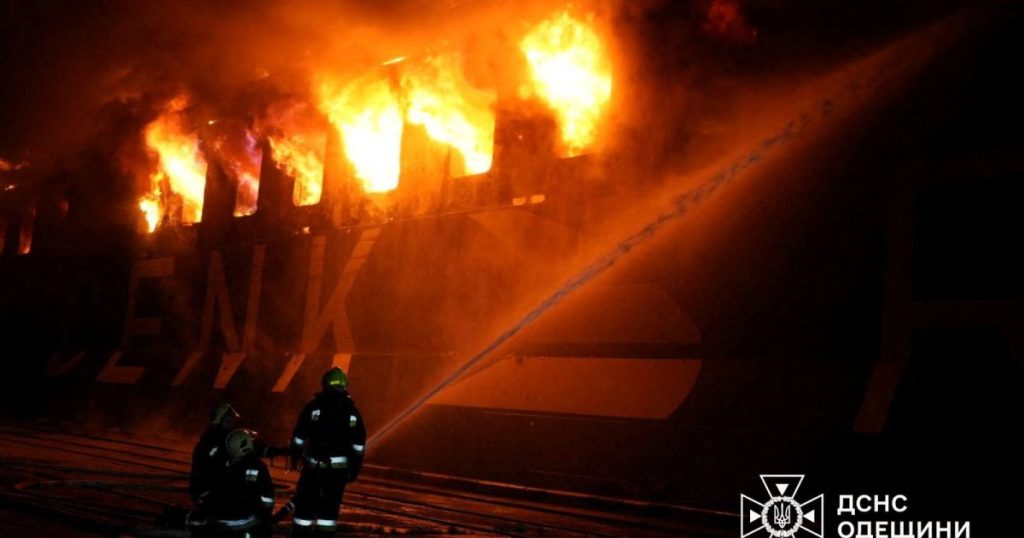
Ukrainian President Volodymyr Zelenskyy said the Russian attacks ‘had no … military purpose whatsoever’. Russian forces have attacked two Ukrainian ports, damaging three Turkish-owned vessels, including a ship carrying food supplies, according to Ukrainian officials and a shipowner. Friday’s attacks by Russian forces targeted Chornomorsk and Odesa ports in Ukraine’s southwestern Odesa region on the Black Sea. A Ukrainian navy spokesperson told the Reuters news agency that three Turkish-owned vessels were damaged in total, but did not provide additional details. Recommended Stories list of 3 itemsend of list Posting video footage on social media of firefighters tackling a blaze on board what he described as a “civilian vessel” in Chornomorsk, Ukrainian President Volodymyr Zelenskyy said the Russian attacks “had no … military purpose whatsoever”. “This proves once again that Russians not only fail to take the current opportunity for diplomacy seriously enough, but also continue the war precisely to destroy normal life in Ukraine,” Zelenskyy said. “It is crucial that … the world maintains the proper moral compass: who is dragging out this war and who is working to end it with peace, who is using ballistic missiles against civilian life, and who is striking the targets that influence the functioning of Russia’s war machine,” he said. Today, the Russian army carried out a missile strike on our Odesa region, and last night there was also a Russian attack on Odesa’s energy infrastructure. At one point we talked about the situation in this city and the people of Odesa with President Trump. Today’s Russian… pic.twitter.com/gIgXUlc4AJ — Volodymyr Zelenskyy / Володимир Зеленський (@ZelenskyyUa) December 12, 2025 Advertisement Zelenskyy did not name the vessel, but it was identified as the Panama-flagged and Turkish-owned Cenk T by Reuters, which matched cranes and buildings to satellite imagery of Chornomorsk port. The ship’s owners, Cenk Shipping, confirmed it was attacked at about 4pm local time (14:00 GMT). There were no casualties among the crew, and damage to the ship was limited, it added. An employee of a private company was also injured in a separate attack on Odesa port, where a cargo loader was also damaged, Ukraine’s Deputy Prime Minister Oleksii Kuleba confirmed. He added that Russia had used drones and ballistic missiles in the port strikes, which were “aimed at civilian logistics and commercial shipping”. Ukraine’s three large Black Sea ports in the Odesa region are a key economic artery for Kyiv. Late on Friday, Turkiye’s Ministry of Foreign Affairs confirmed the vessel had been attacked in Chornomorsk port. It added that there were no reports of injured Turkish citizens. The ministry said in a statement that the attack “validates our previously stated concerns regarding the spread of the ongoing war in the region to the Black Sea, and its impact on maritime security and freedom of navigation”. “We reiterate the need for an arrangement whereby, in order to prevent escalation in the Black Sea, attacks targeting navigational safety as well as the parties’ energy and port infrastructure are suspended,” it added. Hours earlier, in talks with Russian President Vladimir Putin in Turkmenistan’s capital of Ashgabat, Turkish President Recep Tayyip Erdogan called for calm in the Black Sea and suggested that a limited ceasefire for energy facilities and ports could be beneficial for regional security. Turkiye, which has the longest Black Sea coastline at approximately 1,329km (826 miles), has grown increasingly alarmed at the escalating attacks in its back yard and has offered to mediate between Kyiv and Moscow. The attacks come just days after Putin promised retaliation and threatened to cut “Ukraine off from the sea” for Kyiv’s maritime drone attacks on Moscow’s “shadow fleet” – unmarked tankers thought to be used to circumvent oil sanctions – in the Black Sea. Kyiv says the tankers are Moscow’s main source of funding for its almost four-year-old war. It has also tried to squeeze Russian revenues by expanding attacks to the Caspian Sea, where it struck a major oil rig this week. Adblock test (Why?)
Thailand says attacks on Cambodia to continue despite Trump ceasefire claim
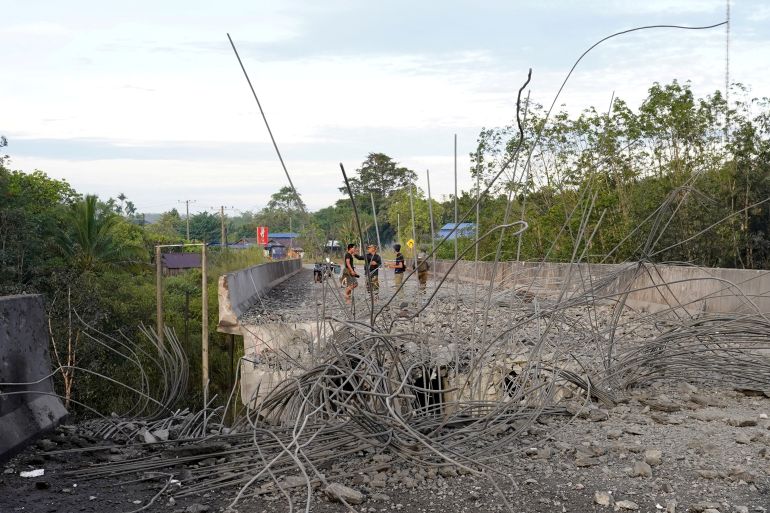
DEVELOPING STORYDEVELOPING STORY, Cambodia’s Defence Ministry said Thai F-16 fighter jets continue to bomb targets inside country after US President Trump announced truce. Published On 13 Dec 202513 Dec 2025 Click here to share on social media share2 Share Thailand’s Prime Minister Anutin Charnvirakul has said military action against Cambodia will continue despite an earlier claim by United States President Donald Trump that he had successfully brokered a ceasefire between the neighbouring countries. “Thailand will continue to perform military actions until we feel no more harm and threats to our land and people. I want to make it clear. Our actions this morning already spoke,” Anutin said in a Facebook post on Saturday morning. Recommended Stories list of 4 itemsend of list The Thai leader’s announcement followed after Cambodia had earlier accused Thailand of continuing to drop bombs in its territory hours after President Trump said Bangkok and Phnom Penh had agreed to stop fighting. “On December 13, 2025, the Thai military used two F-16 fighter jets to drop seven bombs” on a number of targets, the Cambodian Ministry of Defence said in a post on social media. “Thai forces have not stopped the bombing yet and are still continuing the bombing,” the ministry said, listing numerous aerial and ground attacks on villages and settlements up until 8am local time (01:00 GMT) on Saturday morning. Local news outlet Khmer Times cited the Cambodian Ministry of Information as saying that two hotels were bombed in the Thmor Da area of Pursat province, on the border with Thailand. The news outlet published a series of photos showing badly bombed hotel and casino buildings. People stand on a bombed out bridge in Cambodia’s Pursat province on December 13, 2025, amid clashes along the Cambodia-Thailand border [AFP] In another attack, the Thai navy reportedly opened fire from a vessel off the coast, launching 20 artillery shells into Cambodia’s Koh Kong province, striking hotels and beaches. Advertisement Cambodian authorities have not reported any casualties as a result of these most recent attacks. At least 20 people have been killed across both countries, with nearly 200 more wounded, since a peace agreement brokered by Trump in October broke down on Monday. An estimated 600,000 people have also been displaced on both sides of the Thai-Cambodia border this week. Late on Friday night, Trump took to social media to announce he had brokered what he said was an agreement between the leaders of Thailand and Cambodia “to cease all shooting”. “I had a very good conversation this morning with the Prime Minister of Thailand, Anutin Charnvirakul, and the Prime Minister of Cambodia, Hun Manet, concerning the very unfortunate reawakening of their long-running War,” Trump said on his Truth Social platform on Friday. “They have agreed to CEASE all shooting effective this evening, and go back to the original Peace Accord made with me, and them, with the help of the Great Prime Minister of Malaysia, Anwar Ibrahim,” Trump said. A boy stands among people waiting to collect supplies at Batthkav refugee camp in Oddar Meanchey province, Cambodia, on December 12, 2025 [Kim Hong-Ji/Reuters] Trump also claimed in his post that a roadside bomb that had “killed and wounded numerous Thai soldiers was an accident”. Thai Prime Minister Anutin refuted this claim on Facebook too, saying it was “definitely not a roadside accident”. The continued attacks on Saturday mark the sixth consecutive day of fighting between the two Southeast Asian neighbours since cross-border clashes broke out on Monday along the 800-kilometre-long (500-mile) Thai-Cambodia border, where the conflict centres on disputed ownership of centuries-old temples. Adblock test (Why?)
N Korea’s Kim hails ‘ever-victorious’ army’s role in war against Ukraine
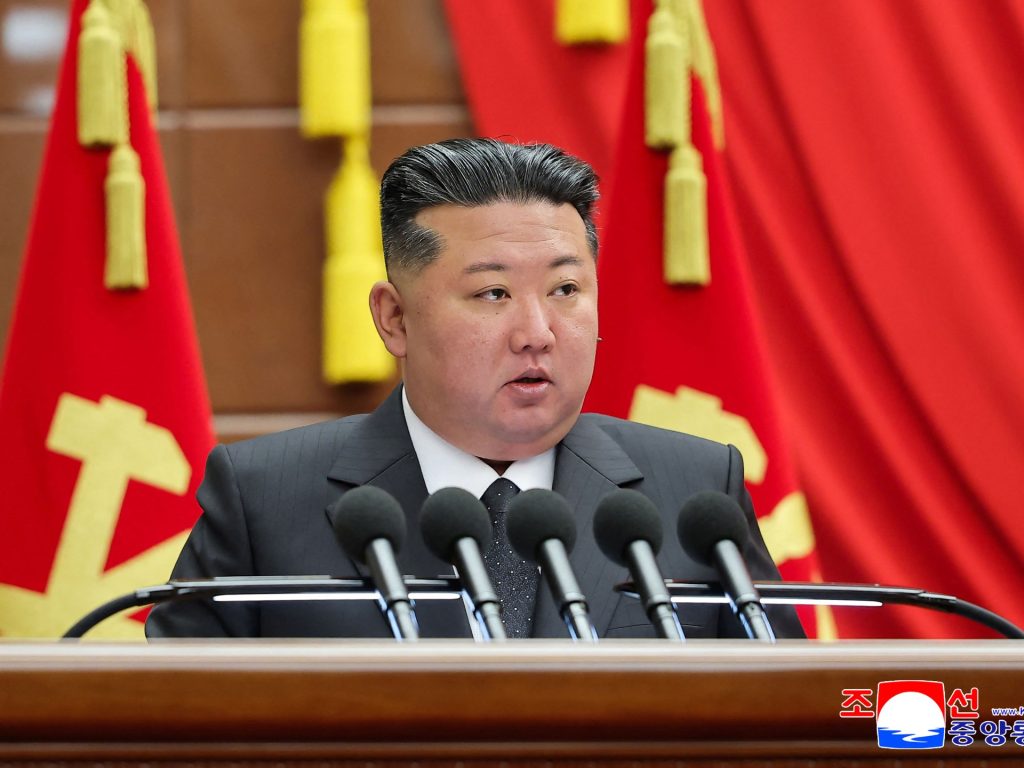
North Korea’s Kim Jong Un tells key party meeting that fighting alongside Russia demonstrates the ‘prestige of our army’. Published On 12 Dec 202512 Dec 2025 Click here to share on social media share2 Share North Korea’s Kim Jong Un praised the deployment of his troops in support of Russia’s war against Ukraine and promised to root out “evil practices” among some officials, state media reports. In remarks concluding a key meeting of his ruling party on Thursday, Kim condemned “the wrong ideological viewpoint and inactive and irresponsible work attitude” of some officials, the state-run Korean Central News Agency (KCNA) said. Recommended Stories list of 4 itemsend of list He also spoke of “shortcomings and evil practices that must be corrected”, KCNA said on Friday. The North Korean news organisation did not offer any specifics regarding the targets of Kim’s comments, though it did say the ruling party had revealed numerous recent “deviations” in discipline – a euphemism often used to refer to corrupt practices. Wrapping up the three-day meeting, Kim reserved praise for the North Korean soldiers fighting against Ukraine alongside Russia, of whom at least 600 have been killed and thousands more injured in the war, according to South Korean estimates. “Over the past year, various soldiers of our military have participated in overseas military operations to demonstrate the reputation of our military,” KCNA said, quoting Kim. The military deployment in support of Russia “demonstrated to the world the prestige of our army and state as the ever-victorious army and genuine protector of international justice”, Kim added. The North Korean leader also hailed efforts this year in “modernising” his country’s defences in the face of great “global geopolitical and technological changes”. Advertisement South Korea’s official Yonhap news agency said Kim had assessed that bolstering military capabilities was an “exact direction to ensure the security and defence of the country”. The meeting of Kim’s ruling Workers’ Party of Korea (WPK) comes in advance of a party congress that is scheduled for early next year. The Ninth Party Congress, which is due to be held in January or February, is expected to see North Korea unveil its policy approach to dealing with the United States and South Korea, as well as policies on the economy and defence, Yonhap reports. The congress will be watched closely, Yonhap said, to determine “whether North Korea will codify Kim’s ‘two hostile states’ stance in the party’s rules as experts forecast Pyongyang to intensify its animosity to Seoul in the new year”. South Korean President Lee Jae Myung has taken several steps to ease tensions with the North since taking office in June, including removing propaganda loudspeakers along the border and banning the dropping of anti-Pyongyang leaflets. Lee also said he was considering an apology to Pyongyang over cross-border provocations allegedly ordered by his predecessor, disgraced ex-President Yoon Suk-yeol. Yoon allegedly ordered drones carrying propaganda leaflets to fly over the North, in a bid, say prosecutors who have indicted the former president, to provoke military tension and boost his political support. Kim has so far rebuffed Lee’s efforts, saying he has no interest in dialogue with the South Korean leader. Adblock test (Why?)
Magnitude 6.7 earthquake hits Japan’s northeast, tsunami warning issued
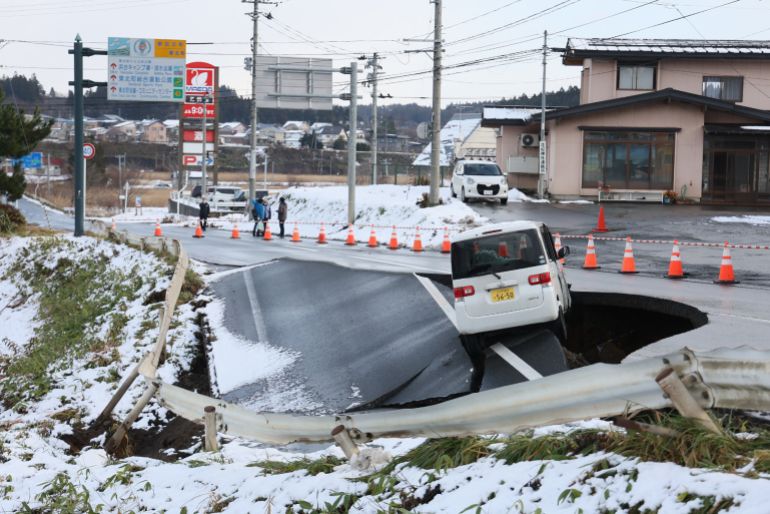
DEVELOPING STORYDEVELOPING STORY, A tsunami warning has been issued following a strong quake off northeast coast of Japan. Published On 12 Dec 202512 Dec 2025 Click here to share on social media share2 Share An earthquake with a preliminary magnitude of 6.7 has hit Japan’s northeastern region, prompting a tsunami advisory from the Japan Meteorological Agency (JMA). The earthquake struck on Friday off the coast of Aomori Prefecture at 11:44am local time (02:44 GMT) at a depth of 20km (12.4 miles), according to the JMA. Recommended Stories list of 4 itemsend of list The United States Geological Survey (USGS) also said that the quake measured 6.7. Japan’s Nuclear Regulation Authority said there were no immediate signs of abnormalities at the region’s nuclear facilities. National broadcaster NHK said that the level of shaking from the quake was less than a bigger magnitude 7.5 earthquake that hit in the same region on Monday and tore apart roads, smashed windows and triggered tsunami waves of up to 70 centimetres (2.3ft). Following Monday’s quake, which injured at least 50 people, the JMA issued a rare special advisory warning to residents across a wide area, from Hokkaido in the north to Chiba, east of Tokyo, to be on alert for an increased possibility of a powerful earthquake hitting again within a week. The northeast region is haunted by the memory of a massive magnitude 9.0 undersea quake in 2011, which triggered a tsunami that left about 18,500 people dead or missing. The JMA issued its first special advisory in 2024 for the southern half of Japan’s Pacific coast, warning of a possible “megaquake” along the Nankai Trough. The government has said that a quake in the Nankai Trough and subsequent tsunami could kill as many as 298,000 people and cause up to $2 trillion in damages. Advertisement Amid fears of a “megaquake”, NHK reported on Thursday that people in the northeast of Japan were stocking up on disaster-related goods such as torches, water storage tanks and support poles to prevent furniture from toppling over due to tremors. One shop in Hokkaido’s Hakodate city reported sales of bottled water and disaster kits tripling following Monday’s quake. “We decided to prepare, so I bought disaster kits for everyone,” a male customer in his 30s told NHK while visiting a shop with his family. Japan sits on top of four major tectonic plates along the western edge of the Pacific “Ring of Fire” and is one of the world’s most seismically active countries. A vehicle rests on the edge of a collapsed road in the town of Tohoku in Aomori Prefecture, on December 9, 2025, following a magnitude 7.5 earthquake off the coast of northern Japan [JIJI Press/AFP] Adblock test (Why?)
‘Catastrophic flooding’ in North America’s Pacific Northwest as rains ease
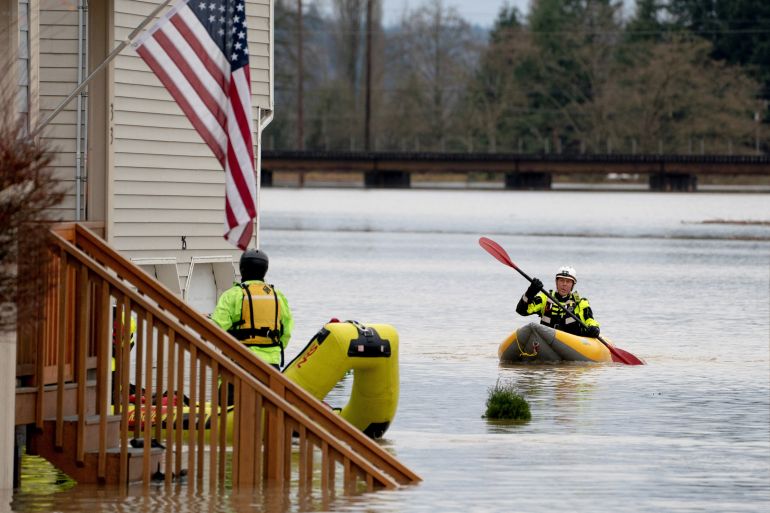
Intense downpours were swept into the region this week by an ‘atmospheric river’ storm system from the Pacific Ocean. By News Agencies Published On 12 Dec 202512 Dec 2025 Click here to share on social media share2 Share Intense rains that triggered “catastrophic flooding” in North America’s Pacific Northwest have finally eased, though meteorologists warn the effects of overflowing rivers and floodwaters will continue to be felt for several days. Tens of thousands of people were told to evacuate on Thursday across the US states of Oregon and Washington, up through the Canadian province of British Columbia, after rainstorms battered the region for several days, causing rivers to burst their banks. Recommended Stories list of 3 itemsend of list Western Washington state has borne the greatest brunt of the storm, with roughly 100,000 residents under “Level 3” evacuation orders. State authorities have ordered people living south of the cities of Seattle and Tacoma to leave their homes, with aerial photographs showing farmland already under water, and populated areas perilously close. In the city of Orting, south of Seattle, authorities warned there is a “significant threat to life and or property”. There have been no reports of casualties or missing people due to the flooding, according to Karina Shagren, spokesperson for Washington’s emergency management division. Rescue personnel prepare to evacuate residents from a home in an area flooded by the Snohomish River, as an atmospheric river brings rain and flooding to the Pacific Northwest, in Snohomish, Washington, US, on December 11, 2025 [David Ryder/Reuters] Across the border in British Columbia, swaths of the Canadian city of Abbotsford, east of Vancouver, were swamped as of Thursday night, with hundreds of properties at risk. Advertisement Five of the six highways leading in and out of Vancouver were also closed due to floods, falling rocks and the risk of avalanches, the province’s Ministry of Transport said, describing the situation as “evolving and very dynamic”. The main highway route between Vancouver and Seattle remains open. The intense downpours were swept into the Pacific Northwest region earlier this week by an atmospheric river, a vast airborne current of dense moisture funnelled inland from the Pacific Ocean. The storm system, which dumped more than 250mm (10 inches) of rain in some places, also brought heavy showers and flooding as far away as western Montana and the edge of northern Idaho. Though the downpour began to lessen on Thursday, the after-effects are expected to linger across the region as high volumes of water make their way through swollen river systems. “While drier weather looks to be in store for this area of the country through the upcoming weekend, the major … catastrophic flooding effects are likely to continue for several days across portions of western Washington State and northwestern Oregon,” the US National Weather Service said. The National Water Center has issued an updated Key Messages for the ongoing Catastrophic flooding impacts this week in Washington. More info: https://t.co/UZ3ekqUUkq #flooding #wawx pic.twitter.com/KwdS8a9T5y — National Water Center (@nwsnwc) December 11, 2025 Adblock test (Why?)
Ukraine reports large Russian mechanised assault in battle for Pokrovsk
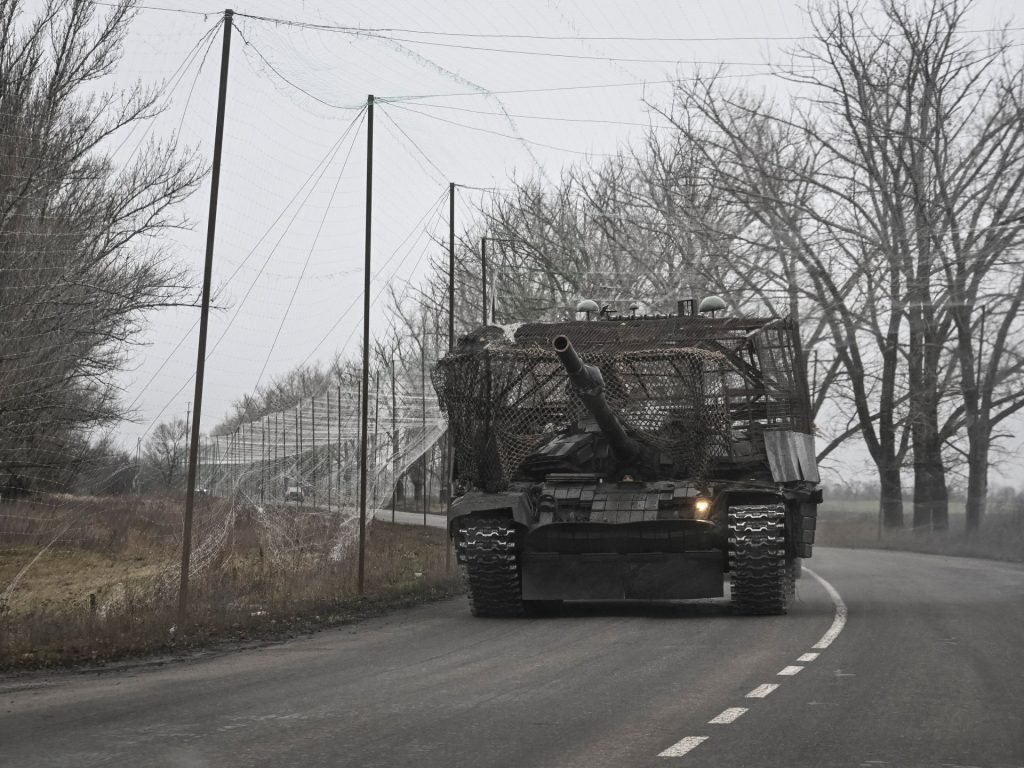
Russia has claimed to be in full control of Pokrovsk, but Ukrainian forces say they still control the northern part of the strategic city in eastern Ukraine. Ukrainian forces have reported an unusually large Russian mechanised attack inside the strategic eastern city of Pokrovsk, where Russia has reportedly massed a force of some 156,000 troops to take the beleaguered and now destroyed former logistics hub. “The Russians used armoured vehicles, cars, and motorcycles. The convoys attempted to break through from the south to the northern part of the city,” Ukraine’s 7th Rapid Response Corps said in a statement on Wednesday regarding an assault earlier in the day. Recommended Stories list of 4 itemsend of list A source in the 7th Rapid Response Corps told the Reuters news agency that Russia had deployed about 30 vehicles in convoy, making it the largest such attack yet inside the city. The source added that previously, Russia had deployed just one or two vehicles to aid troop advances. While Russia has claimed full control of Pokrovsk, Kyiv maintains that its troops still hold the northern part of the city, where fierce urban battles continue to rage. Russian troops have pushed into the city for months in small infantry groups, looking to capture the former logistics hub as a critical part of Moscow’s campaign to seize the entire industrial Donbas region of eastern Ukraine. Video clips shared by the 7th Rapid Response Corps showed heavy vehicles in snow and mud, as well as drone attacks on Russian troops and explosions and burning wreckage. Russian forces were attempting to exploit poor weather conditions but had been pushed back, the unit said on Facebook. Capturing Pokrovsk would be Russia’s biggest prize in Ukraine in nearly two years, and the city’s weakening defence amid Moscow’s onslaught has added to pressure on Kyiv, which is attempting to improve terms in a United States-backed proposal for a peace deal that is widely seen as favourable to Moscow. Ukraine’s top military commander, Oleksandr Syrskii, told journalists earlier this week that the situation around Pokrovsk remained difficult as Russia massed a force of some 156,000 around the beleaguered city. Advertisement Syrskii said Russian troops were staging the military buildup in the area under the cover of rain and fog. George Barros, Russia team lead at the Institute for the Study of War – a US-based think tank – said Moscow is “hyping” the importance of the fall of Pokrovsk “in order to portray Russia’s battlefield advances as inevitable”. “That sense of inevitability is being echoed by some members of President Donald Trump’s negotiating team trying to pull together a peace proposal for the Ukraine war,” Barros wrote in an opinion piece shared online. But Russia has paid a huge price in its push to take the city with “more than 1,000 armoured vehicles and over 500 tanks” lost in the Pokrovsk area alone since the beginning of Russia’s offensive operations in October 2023 to seize nearby Avdiivka, which fell to Russian forces in early 2024 in one of the bloodiest battles of the war so far. NEW: The Kremlin is significantly intensifying its cognitive warfare effort to present the Russian military and economy as able to inevitably win a war of attrition against Ukraine. ⬇️ The Kremlin’s cognitive warfare effort aims to achieve several of Putin’s original war aims… pic.twitter.com/zXxCKrI06x — Institute for the Study of War (@TheStudyofWar) December 10, 2025 On Wednesday, President Trump said he had exchanged “pretty strong words” with the leaders of France, Britain and Germany on Ukraine, telling them their plan to hold new talks on a proposed US peace plan this weekend risked “wasting time”. “We discussed Ukraine in pretty strong words,” Trump told reporters when asked about the phone call with British Prime Minister Keir Starmer, French President Emmanuel Macron and German Chancellor Friedrich Merz. “They would like us to go to a meeting over the weekend in Europe, and we’ll make a determination depending on what they come back with. We don’t want to be wasting time,” Trump said. The initial US peace plan that involved Ukraine surrendering land that Russia has not captured was seen by Kyiv and its European allies as aligning too closely with many of Russia’s demands to end the war, and has since been revised. Trump has been pushing Ukrainian President Volodymyr Zelenskyy to agree to the US plan while Ukrainian officials told the AFP news agency on Wednesday that Kyiv had sent an updated draft of the plan back to Washington. Adblock test (Why?)
Despite opposition, US House passes record $901bn defence spending bill
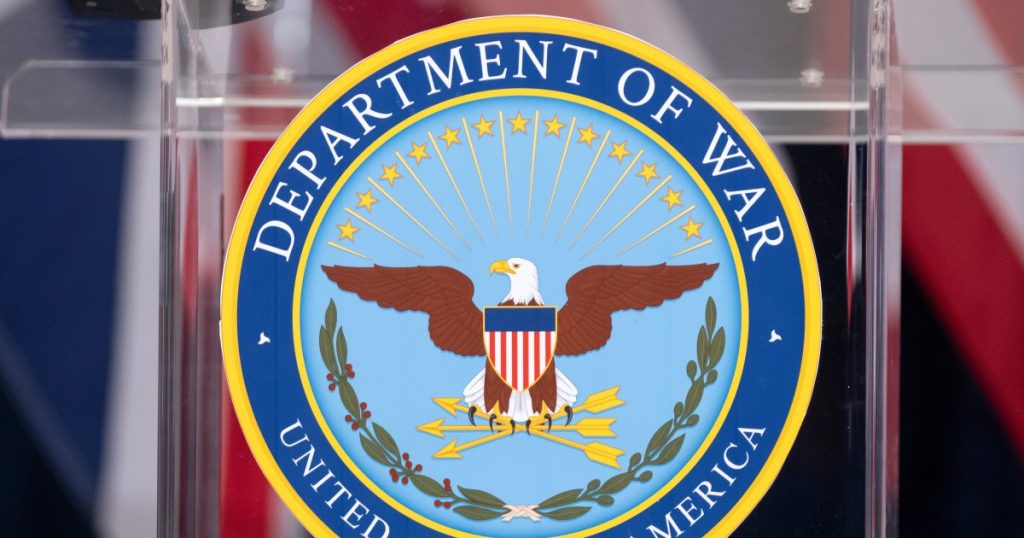
The United States House of Representatives has passed a far-reaching defence policy bill authorising a record $901bn in annual military spending. The tally in Wednesday’s vote saw 312 lawmakers vote in favour of passing the National Defense Authorization Act (NDAA), with 112 opposing the bill. It has now been sent to the Senate for consideration and is expected to pass next week. Recommended Stories list of 3 itemsend of list The $901bn in defence spending for the 2026 fiscal year is $8bn more than US President Donald Trump requested in May this year. The sweeping 3,086-page bill, which was unveiled on Sunday, includes typical NDAA provisions on defence acquisitions to compete militarily with rivals such as China and Russia. It also includes measures to improve living conditions for American troops, including an almost 4 percent pay rise and improvements in military base housing. Lawmakers also forced the inclusion of several provisions cementing Washington’s commitment to Europe’s defence in the face of Russian aggression, including $400m in military assistance to Ukraine in each of the next two years to help repel Russia’s invasion. Another measure requires the Pentagon to keep at least 76,000 troops and major equipment stationed in Europe unless NATO allies are consulted. This year’s bill, however, also cut several programmes reviled by Trump, including about $1.6bn in funding to initiatives focusing on diversity, equity and inclusion, as well as climate change. The legislation will now head to the Senate, with leaders aiming to pass the bill before lawmakers depart for a holiday break. Trump will then sign it into law once it reaches the White House. Bill puts pressure on Defense Secretary Hegseth over transparency of attacks The NDAA is one of a few major pieces of legislation to typically enjoy broad bipartisan support, having made it through Congress every year since its enactment in 1961. Advertisement This year’s process was rockier than usual, coming at a time of growing friction between the Republican-controlled Congress and the Trump administration over the management of the US military. Before the vote, members of both parties urged their lawmakers to support the vital defence legislation, even if they objected to individual provisions contained within it. Al Jazeera’s correspondent in Washington, DC, Mike Hanna, said that while there was “some significant dissent”, the bill still passed “very easily indeed”. Also tucked into the NDAA are several measures pushing back against the Department of Defense, notably a demand for more transparency on deadly attacks carried out by the US military on alleged drug smuggling vessels in the Caribbean Sea and eastern Pacific Ocean in recent months. Hanna said a “very noticeable” part of the bill threatens to take away 25 percent of US Defense Secretary Pete Hegseth’s travel funding unless he discloses more information on the US attacks on vessels in the Caribbean Sea and Pacific Ocean, including allowing lawmakers to review unedited video of the strikes and the orders given to carry out the attack. “This is a very strong move by the House forcing, it would appear, the defence secretary to provide full details of these attacks,” Hanna said. At least 86 people have been killed across 22 known strikes since the Trump administration announced the first attack in early September. The president has depicted them as a necessary counter-narcotics effort, even though they are widely considered illegal under both international and US law. Hardline conservative lawmakers had expressed frustration that the NDAA did not do more to cut US commitments overseas, including in Europe. Republican chair of the House Armed Services Committee Mike Rogers responded, saying “we need a ready, capable and lethal fighting force”. “The threats to our nation, especially those from China, are more complex and challenging than at any point in the last 40 years,” Rogers said. The top Democrat on the House Armed Services Committee, Adam Smith, said that while the bill does not do enough to rein in the Trump administration, it’s a “step in the right direction towards reasserting the authority of Congress”. “The biggest concern I have is that the Pentagon, being run by [Secretary Hegseth] and by President Trump, is simply not accountable to Congress or accountable to the law,” Smith said. Adblock test (Why?)
‘A gesture of love’: Italy’s cuisine joins UNESCO’s cultural heritage list
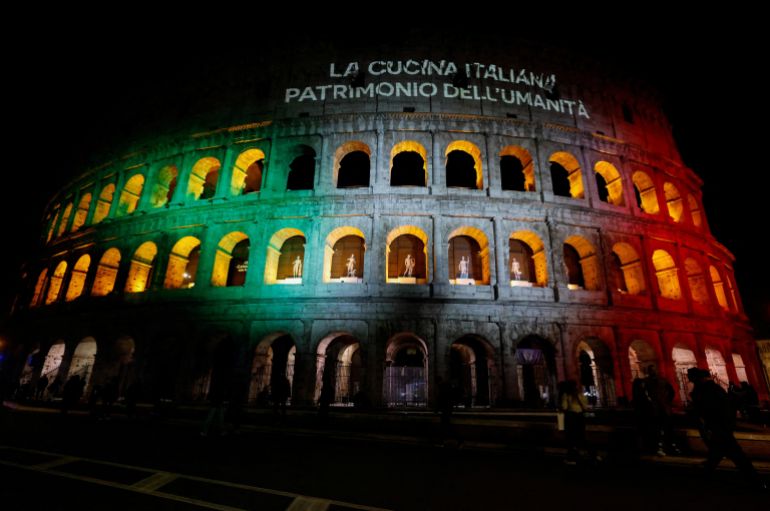
A UNESCO panel backed Italy’s bid, recognising Italian cuisine as a social ritual that binds families, communities. Italian cuisine, long cherished for its deep regional traditions, has been officially recognised by UNESCO as an “intangible cultural heritage” – a designation the country hopes will elevate its global prestige and draw more visitors. “We are the first in the world to receive this recognition, which honours who we are and our identity,” Italy’s Prime Minister Giorgia Meloni said in a statement on Instagram on Wednesday. Recommended Stories list of 4 itemsend of list “For us Italians, cuisine is not just food, not just a collection of recipes. It is much more, it is culture, tradition, work, and wealth,” Meloni said. The vote by a cultural panel of UNESCO – the United Nations Educational, Scientific and Cultural Organization – meeting in New Delhi capped a process Italy launched in 2023, with the government portraying the country’s culinary tradition as a social ritual that binds families and communities. 🔴 BREAKING New inscription on the #IntangibleHeritage List: Italian cooking, between sustainability and biocultural diversity, #Italy🇮🇹. Congratulations!https://t.co/xoL14QjPPR #LivingHeritage pic.twitter.com/2iY86Obn3n — UNESCO 🏛️ #Education #Sciences #Culture 🇺🇳 (@UNESCO) December 10, 2025 ‘Cooking is a gesture of love’ UNESCO did not single out any famous dishes or regional specialities. Instead, the citation focused on how much Italians value the everyday rituals around food: the big Sunday lunch, the tradition of nonnas teaching kids how to fold tortellini just right, and simply sitting down together to enjoy a meal. Advertisement “Cooking is a gesture of love; it’s how we share who we are and how we look after each other,” said Pier Luigi Petrillo, part of Italy’s UNESCO campaign and a professor at Rome’s La Sapienza University. In its announcement, UNESCO described Italian cuisine as a “cultural and social blend of culinary traditions”. “Beyond cooking, practitioners view the element as a way of caring for oneself and others, expressing love and rediscovering one’s cultural roots. It gives communities an outlet to share their history and describe the world around them,” it added. The UNESCO listing could deliver further economic benefits to a country already renowned for its cooking and where the agri-food supply chain accounts for about 15 percent of the national gross domestic product (GDP). It could also bring some relief to traditional family-run restaurants, long the backbone of Italian dining, which are facing a harsh economic climate in a market increasingly polarised between premium and budget options. The Colosseum is illuminated during a special light installation, after Italy won a place on UNESCO’s cultural heritage list [Remo Casilli/Reuters] Honouring cultural expressions Italy is not the first country to see its cuisine honoured as a cultural expression. In 2010, UNESCO inscribed the “gastronomic meal of the French” on its intangible heritage list, calling out France’s tradition of marking life’s important moments around the table. Other food traditions have been added in recent years, too, including the cider culture of Spain’s Asturian region, Senegal’s Ceebu Jen dish, and the traditional cheese-making of Minas Gerais in Brazil. UNESCO reviews new candidates for its intangible-heritage lists every year under three categories: a representative list; a list for practices considered in “urgent” need of safeguarding; and a register of effective safeguarding practices. At this year’s meeting in New Delhi, the committee evaluated 53 proposals for the representative list, which already includes 788 entries. Other nominees included Swiss yodelling, the handloom weaving technique used to make Bangladesh’s Tangail sarees, and Chile’s family circuses. A woman spoons ‘spaghetti alla Carbonara’ during a cooking competition [Andrew Medichini/AP Photo] Adblock test (Why?)
Trump’s $12bn aid package: Are tariffs bleeding US farmers?
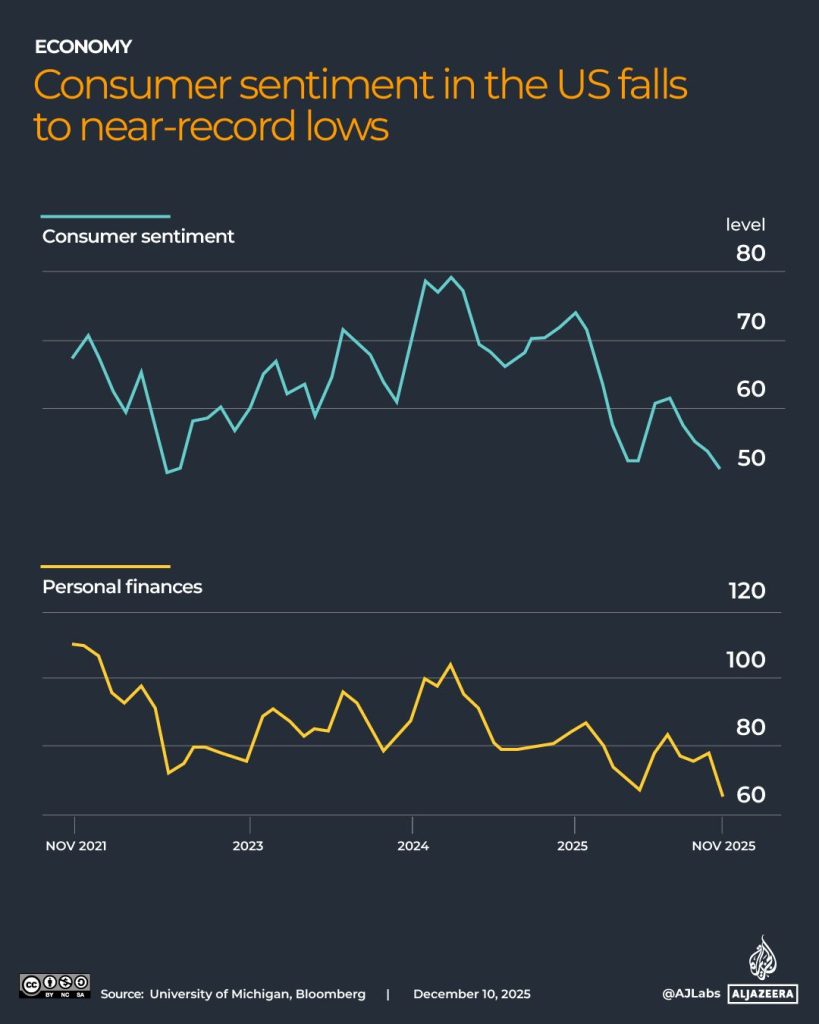
US President Donald Trump has announced a $12bn aid package for farmers, offering financial assistance to a core part of his political base that has been hit hard by falling crop prices and the impact of his trade policies. Unveiling the plan at the White House in Washington, DC alongside Agriculture Secretary Brooke Rollins and several farmers on Monday, Trump said: “Maximising domestic farm production is a big part of how we will make America affordable again and bring down grocery prices.” Recommended Stories list of 4 itemsend of list Rollins said the Farmer Bridge Assistance programme’s initial phase would provide $11bn for row crop farmers – those who cultivate crops such as corn, soya beans and cotton in rows. An additional $1bn has been earmarked for farmers who grow some speciality crops not covered by this. The aid money is expected to be made available by the end of February. The package is Trump’s latest effort to defend his economic record and respond to public anxiety about rising food costs. It also comes after China curbed its purchases of US soya beans in retaliation for steep US trade tariffs, which have also caused the cost of fertiliser and other agricultural products to soar. How will this aid be distributed to farmers? The US Department of Agriculture (USDA) will calculate per-acre payments for different crops using a formula that estimates production costs. Payments will be capped at $155,000 per farm or individual, and only farms earning less than $900,000 annually will qualify. The USDA’s formula is designed to bolster small-scale producers who may be struggling more than others. “We looked at how they were hurt, to what extent they were hurt,” Trump said. Advertisement Farmers will begin receiving funds on February 28, according to Rollins. Meanwhile, applications for funds will open in the coming weeks so that farmers “will know exactly what that number looks like”. Trump said the money for the scheme will come from tariff revenues. Though Trump has, at times, downplayed cost-of-living issues, he visited Pennsylvania on Tuesday to explain to voters how his administration is addressing this concern. At the same time, he defended his record on trade and the sweeping reciprocal tariffs he has imposed on countries around the world this year. “It’s amazing,” Trump said of tariffs at a rally in Mount Pocono, Pennsylvania. “It’s the smart people who understand it. Other people are starting to learn, but the smart people really understand it.” Why is this aid package being introduced now? Many farmers continue to support Trump. The country’s most farming-dependent counties overwhelmingly backed him in last year’s presidential election by an average of 77.7 percent, according to the USDA. Experts say his anti-establishment rhetoric has resonated with rural communities that feel overlooked by political elites in Washington, DC. His promises of deregulation also appealed to many farmers who feel frustrated by federal rules they view as burdensome. But the president’s trade agenda and the imposition of trade tariffs to address the country’s trading deficit with many other countries have hit farmers hard. Trump’s “liberation day” tariff announcement earlier this year provoked steep retaliatory duties on US products, particularly from China, including on US agricultural exports. Trump’s latest package is an echo of a $12bn programme he offered to farmers in 2018 during his first-term administration’s initial trade dispute with China. Which crops have been hardest hit by trade tariffs? Soya bean farmers have been badly bruised by the US-China trade spat this year. Trump was the principal architect of recent tensions – his sweeping “reciprocal” tariffs, launched earlier this year, targeted China more than any other country. Historically, more than half of all soya beans produced in the US – mainly in the Midwest – have been sold to China. But after Trump imposed steep tariffs on Chinese goods, Beijing raised duties on US soya beans to 34 percent. Last year, China bought slightly more than 50 percent (27 million metric tons) of the $24.5bn of produce that US soya bean farmers sold to international markets. This year, US exports to China have so far fallen by more than half. Advertisement Instead, China has begun buying more soya beans from Brazil and other South American nations. The American Soybean Association has also warned that tariffs are driving up costs for soya bean producers. In particular, US tariffs on Moroccan fertiliser, which have been hiked from 2.1 percent to 16.8 percent, have squeezed farmers. In October, following a meeting with Chinese President Xi Jinping in South Korea, Trump said Beijing had committed to buying 12 million metric tons of US soya beans by the end of this year, and 25 million metric tons annually for the next three years. Trump is also facing pressure to address rising beef prices. On November 7, he asked the Department of Justice to investigate foreign-owned meatpackers in the US, which he claims are driving up costs, though he has provided no supporting evidence for this. Then, on November 20, Trump announced he would peel back trade tariffs of up to 50 percent on certain Brazilian agricultural products, including coffee and beef. The reversal was broadly interpreted as an acknowledgement that the tariffs were fuelling inflationary pressures at home. More broadly, US consumer sentiment remains near record lows. In November, data released by the University of Michigan showed that Americans view their personal finances as the weakest they’ve been since 2009. High inflation is the primary cause of concern. Prices of other food staples have also risen recently. Compared to last year’s Thanksgiving Day, potatoes this year on the November US holiday were up by 3.7 percent, bread rolls 3.9 percent and apples 5.3 percent – all outpacing the 3 percent annual inflation rate, government data shows. Will Trump’s bailout package be enough to rescue farmers? While farmers have generally welcomed Trump’s bailout package, many view it as a temporary reprieve rather than a solution to long-term challenges like rising costs and the decline of small-scale farming. “[It’s]

